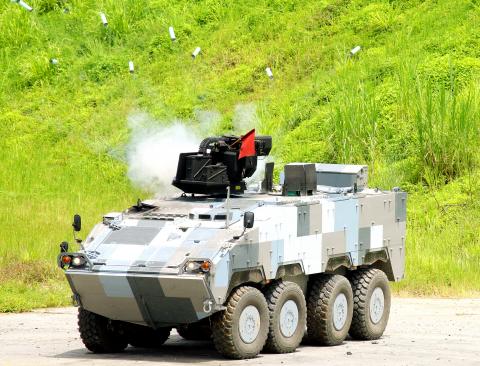Taiwan’s problem-plagued CM-32 “Clouded Leopard” armored infantry fighting vehicle ran into more difficulties this week with the announcement that delivery would be delayed by another five years, but the military denied that this was linked to steel-plate cracking and other design issues.
First unveiled in January 2005, the domestically produced eight-wheel-drive vehicle has encountered various problems from its inception and came close to being abandoned altogether in 2009 over design flaws and budgetary irregularities at the Ministry of National Defense, which resulted in the legislature’s decision to freeze two-thirds of the production budget.
Earlier this week, the Chinese-language United Daily News reported that cracking in the vehicle’s steel plating — which first surfaced three years ago — as well as disagreements over what type of cannon to use on the mounted turret, had prompted a decision to delay delivery of the vehicle by five years to 2019.

Photo: CNA
The 25-tonne Clouded Leopard, a joint project between the Ordnance Readiness Development Center and the Chungshan Institute of Science and Technology started in 2000, is intended as a replacement for older armored personnel carriers and light-armed vehicles, including M113s and V-150s. Mass production, initially scheduled for 2007, began in late 2010, with the army set to procure 652 CM-32s for NT$58 billion (US$1.8 billion), or about US$2.7 million per vehicle.
Under the plan, the vehicles were scheduled for delivery in 2014. So far, only a limited number have been handed over to the army and to the Military Police for presidential protection.
Clarifying the matter, the min said it had suspended mass production after the chassis of four of the 14 CM-32s manufactured in 2008 displayed some cracks, but resumed full production in December 2010 after the problem was resolved.
“We instructed Army Command Headquarters, the Ordnance Readiness Development Center and the CSIST to form a taskforce, and to invite academics to jointly ascertain the causes of the cracks and address the problems,” the ministry said.
Production of all 652 CM-32s will be done by 2019, it said, without providing reasons for the current delay.
Additional reporting by Stacy Hsu

Tropical Storm Gaemi strengthened into a typhoon at 2pm yesterday, and could make landfall in Yilan County tomorrow, the Central Weather Administration (CWA) said yesterday. The agency was scheduled to issue a sea warning at 11:30pm yesterday, and could issue a land warning later today. Gaemi was moving north-northwest at 4kph, carrying maximum sustained winds near its center of up to 118.8kph and gusts of 154.8kph. The circumference is forecast to reach eastern Taiwan tomorrow morning, with the center making landfall in Yilan County later that night before departing from the north coast, CWA weather forecaster Kuan Shin-ping (官欣平) said yesterday. Uncertainty remains and

SEA WARNING LIKELY: The storm, named Gaemi, could become a moderate typhoon on Wednesday or Thursday, with the Taipei City Government preparing for flooding A tropical depression east of the Philippines developed into a tropical storm named Gaemi at 2pm yesterday, and was moving toward eastern Taiwan, the Central Weather Administration (CWA) said. Gaemi could begin to affect Taiwan proper on Tuesday, lasting until Friday, and could develop into a moderate typhoon on Wednesday or Thursday, it said. A sea warning for Gaemi could be issued as early as Tuesday morning, it added. Gaemi, the third tropical storm in the Pacific Ocean this typhoon season, is projected to begin moving northwest today, and be closest to Taiwan on Wednesday or Thursday, the agency said. Today, there would likely

DISRUPTIONS: The high-speed rail is to operate as normal, while several airlines either canceled flights or announced early departures or late arrivals Schools and offices in 15 cities and counties are to be closed today due to Typhoon Gaemi, local governments announced last night. The 15 are: Taipei, New Taipei City, Taoyuan, Tainan, Keelung, Hsinchu and Kaohsiung, as well as Yilan, Hualien, Hsinchu, Miaoli, Chiayi, Pingtung, Penghu and Lienchiang counties. People should brace for torrential rainfall brought by the storm, with its center forecast to make landfall on the east coast between tonight and tomorrow morning, the Central Weather Administration (CWA) said. The agency issued a sea warning for the typhoon at 11:30pm on Monday, followed by a land warning at 11:30am yesterday. As of

CASUALTY: A 70-year-old woman was killed by a falling tree in Kaohsiung as the premier warned all government agencies to remain on high alert for the next 24 hours Schools and offices nationwide are to be closed for a second day today as Typhoon Gaemi crosses over the nation, bringing torrential rain and whipping winds. Gaemi was forecast to make landfall late last night. From Tuesday night, its outer band brought substantial rainfall and strong winds to the nation. As of 6:15pm last night, the typhoon’s center was 20km southeast of Hualien County, Central Weather Administration (CWA) data showed. It was moving at 19kph and had a radius of 250km. As of 3pm yesterday, one woman had died, while 58 people were injured, the Central Emergency Operation Center said. The 70-year-old